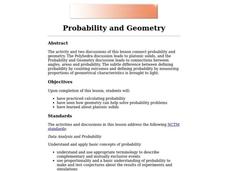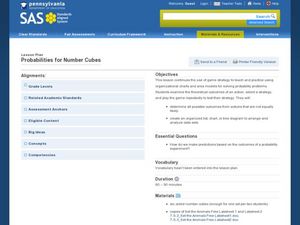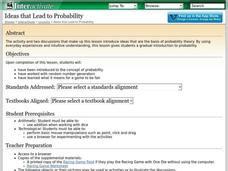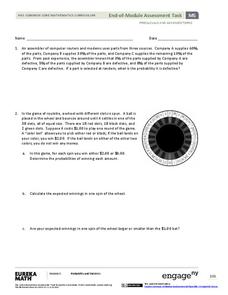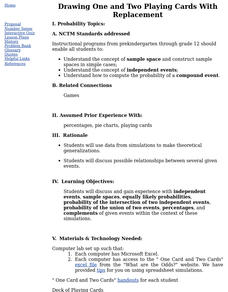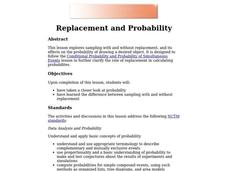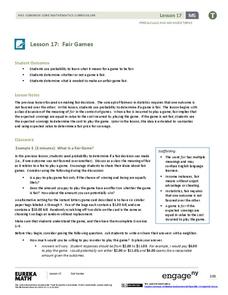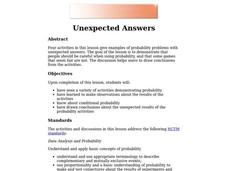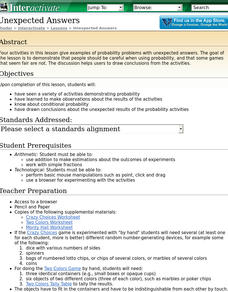Curated OER
Ideas That Lead to Probability
Students explore and define the concept of probability. They utilize a random number generator to determine the fairness of a game. Internet and printable versions fo the activities are included.
Curated OER
Probability and Geometry
Students explore the ways Geometry can help solve probability problems. Students describe platonic solids and practice calculating probability using an online resource. They construct dice with various numbers of sides to demonstrate...
Curated OER
Probabilities for Number Cubes
Students explore the concept of probability. In this probability lesson, students roll a six-sided number cube and record the frequency of each outcome. Students graph their data using a frequency chart and keep tally marks...
Curated OER
Ideas that Lead to Probability
Students explore the concept of probability. In this probability lesson plan, students use random number generators to determine probabilities of events. Students discuss if certain probable events are fair. Students determine fair ways...
EngageNY
End-of-Module Assessment Task - Precalculus (Module 5)
Give your young scholars a chance to show what they've learned from the module. The last installment of a 21-part series is an end-of-module assessment task. It covers basic and conditional probabilities, expected value, and...
EngageNY
Mid-Module Assessment Task: Pre-Calculus Module 5
Determine if any reteaching with a mid-module assessment task. The assessment covers the general multiplication rule, permutations and combinations, and probability distributions for discrete random variables.
Curated OER
Drawing One and Two Playing Cards With Replacement
Math whizzes use data from simulations to make theoretical generalizations and discuss possible relationships between several given events. They use a simple card game to generate data to be analyzed.
Curated OER
Games for Probability: In-Class and Powerball Simulation
Your soon-to-be statisticians play a game to understand the difference between independent and dependent experiments and probability. They draw colored cubes from a bag and then, by either replacing the cube in the bag, or not, for each...
Mathematics Assessment Project
Lottery
A probability activity presents a lottery game as an idea for a fundraiser. Pupils analyze the game to determine the number of possible outcomes, then determine whether the game would be a good way to raise funds and to support...
Curated OER
From Probability to Combinatorics and Number Theory
Learners see how division is used to help solve probability problems. They use tables as data structures where they are used to count outcomes and to compute probabilities. Students use games to help solve probability problems.
Curated OER
Replacement and Probability
Students explore sampling with and without replacement. They explore the effects on the probability of drawing a desired object. Students examine probability and the difference between sampling with and without replacement.
CK-12 Foundation
Discrete Random Variables: Roll the Dice!
And the winner is ... not always who it appears to be. An interactive gives the directions for a dice game that on the surface gives one player an advantage over the other. Pupils look closer at the possible outcomes and find the...
Shodor Education Foundation
Introduction to the Concept of Probability
Acquaint mathematicians to the concept of probability with a discussion about the results of a game. Then have them play a dice, card, spinner, or coin game and recording the number of wins vs. the number of tries on an interactive web...
Curated OER
Fair Games
Fifth graders examine the statistics of playing games. Many games of chance and activities in maths text books involve rolling two dice and combining the scores, usually by addition. Students often find the probabilities of such events...
Curated OER
Compound Events: Independent and Dependent
For this probability worksheet, students analyze word problems to determine for part one the independent events and for part two the dependent events. There are 6 questions.
Mathematics Assessment Project
Spinner Bingo
Learners are in it to win it for a fun math activity! After comparing Bingo boards to figure out which one is most likely to win, individuals then determine the numbers to choose in order to create a board with the best...
Curated OER
Matching Pairs
Young scholars examine the probability of the various findings in a game and determine the odds of winning. They differentiate between the facts of odds versus probability. Students use higher order thinking skills to explain how a...
Curated OER
Unexpected Answers
Students explore and complete a variety of activities demonstration probability. They make observations about the results of the activities. Students complete and discuss conditional probability. Also, students draw conclusions about...
Capital Community College
Subject Verb and Pronoun Antecedent Agreement Problems
Here is a tricky little interactive online quiz with which your motivated learners can test themselves on the finer points of subject-verb and pronoun-antecedent agreement. They need to know that macaroni and cheese is actually a...
McGraw Hill
Arthropods
Are spiders related to crabs? Study the order of arthropods with a reading selection about animal diversity. It provides details about each class within the order, as well as vivid pictures and explanatory charts.
Curated OER
Unexpected Answers
Students consider probability problems with unexpected and surprising answers.
Visa
A Way to Wealth: Understanding Interest and Investments
Money motivates! Help young bankers understand how math plays a part in investing. Give learners math practice while instilling real-world financial literacy skills.
PBS
Pbs: The Lowdown: Your Odds of Winning Powerball: Probabilities of Compound Events Using Visuals
In this video, explore the odds of winning the Powerball lottery and learn what few people realize about their chances of winning: they are miniscule. In the accompanying classroom activity, students create simple lottery models to help...
Illustrative Mathematics
Illustrative Mathematics: 7.sp Red, Green, or Blue?
This is a lesson plan for a probability game for two people. Aligns with 7.SP.C.8.



